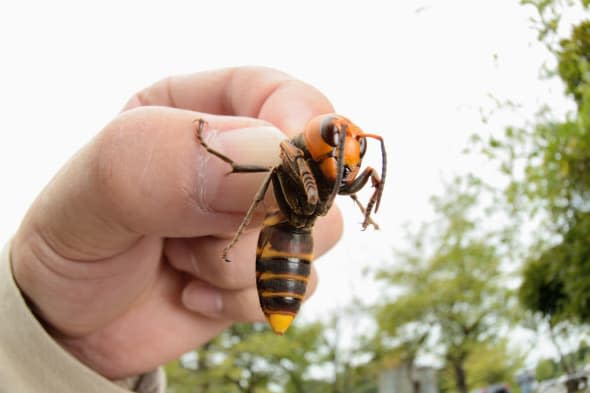More killer Asian hornets on the way to Britain

Swarms of giant Asian hornets could be on their way to Britain.
The deadly insects have already killed six people in France and it is now feared that the killer hornets are en route to the UK.
Last September it was reported that their arrival in Britain was predicted by Franck Muller of the Museum of National History in Paris back in February 2011, when he told the Daily Telegraph they would cross into Britain within "three to four years".
The insect's toxic sting can cause death through anaphylactic shock and kidney failure.
The House of Commons Environmental Audit Committee's (EAC) report on invasive non-native species warns that it is highly likely that the hornet will enter Britain through soil from imported plants or by flying across the Channel.
The EAC's report highlighted the Asian hornet as a particular cause of concern saying, "some invasive species have direct human health effects...the Asian Hornet, which might soon arrive here, has killed six people in France."
The deadly hornets are just one of hundreds of alien species invading the UK. Earlier this week we reported on the threats non-native species pose to our native plants and wildlife.
The giant Asian hornets have wreaked havoc across France since their arrival in a consignment of Chinese pottery in late 2004.
As of 2012 the species had colonised 39 of France's 100 departments.
According to the Telegraph, the insects are thriving due to a lack of indigenous predators.

Shin.T
The viscous insect, distinguishable by its dark colour and yellow feet, can grow up to 5cm long - that's about twice the size of a standard hornet - and they have a 6mm sting.
The natural predators have jaws powerful enough to chew through regular protective bee suits and their venom, which they can spray, dissolves human flesh.
A National Geographic documentary warns that if their venom lands in the eyes, the eye tissue will melt.
Over the past few years, several attacks on humans have been reported. In 2009, hundreds of the insects attacked a mother out walking with her five-month old baby in the Lot-et-Garonne department, before turning on a neighbour who ran over to help. They then pursued two passers-by and two Dutch tourists on bikes.
The EAC is calling for the Government to be given new powers to eradicate invasive species before they become established.
Joan Walley, chair of the committee, said: "These invasive species can harm native wildlife, clog up our waterways, cause costly problems and even harm human health."
Asian hornets prey on native honeybees, wasps and other pollinators, potentially devastating hives and threatening honey and crop production.
The British Beekeepers Association writes: "Although it is not yet present in the UK, it is considered likely to arrive soon. The places it is most likely to be found are in southern parts of England (it may be able to cross the channel from France) or goods among which it could be accidentally imported (such as soil with imported pot plants, cut flowers, fruit and timber.)"
The bee-eating invaders have already almost wiped out France's bee population.
Contingency plans are currently being drawn up in anticipation of their arrival in Britain.
Witnesses of the Asian hornet here in the UK are asked to take pictures and email them along with details of the sightings to the Non Native Species Secretariat.

Related stories
Swarms of 'angry' killer Asian hornets heading to Britain
Alien wildlife invading Britain





